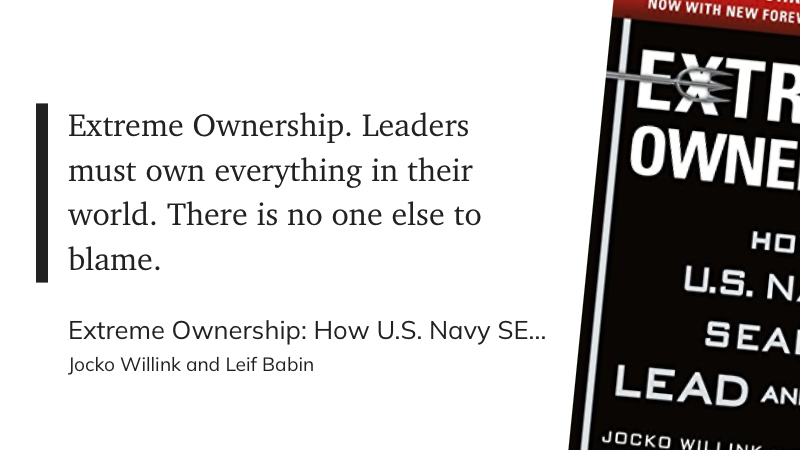Shit may flow downhill, but responsibility flows uphill
Bob moved to New York City to work for me. He was working for one of our largest customers, a large hedge fund. Two weeks in, he was fired. What do we take away from this?

Bob moved to New York City to work for me. He was working for one of our largest customers, a large hedge fund.
Two weeks in, he was fired.
Bob had told the customer that he didn’t know what he was doing. He had cheated throughout the interview process by having someone feed him answers from behind the screen.
Our customer rightfully fired Bob on the spot.
Then they called me and explained what had happened. We lost the contract, but at least we didn’t get blacklisted from future work, even though it would have been justified.
This is Bob’s fault! Or is it? Ultimately it doesn’t matter if Bob is at fault or not.
What does matter is that it is my fault.
The book Extreme Ownership say:

The above story is true, except for Bob's name. We were able to avoid getting blacklisted thanks to us investing years of effort into owning the relationship with the customer. I had owned the relationship.
In the recently leaked PDF for new hires, Mr. Beast writes:
I want less excuses in this company. Take ownership and don’t give your project a chance to fail. Dumping your bottleneck on someone and then just walking away until it’s done is lazy and it gives room for error and I want you to have a mindset that God himself couldn’t stop you from making this video on time. Check. In. Daily. Leave. No. Room. For. Error.
Ownership and responsibility is not a priority just for me as the company owner. It’s critical for anyone, at any level of an organization. A good leader (or prospective leader), regardless of seniority in an organization accepts this responsibility and works to continuously improve what they can within their purview.
As the company owner, I had more power and agency than Bob, the customer, or anyone else involved. What could I have done differently?
Well, I mentioned that Bob had moved for the job, and we were a remote first company, so Bob had been interviewed entirely via Zoom where cheating was much easier. Given the importance of this customer, I should have flown Bob out for an in person interview where cheating is much harder.
Think of a similar scenario that has happened to you recently. Where did someone else cause a failure? Did you blame them? A few examples of problems and ways to own them to get the juices flowing:
- A sales person forgets to follow up with an important customer. Buy them better tools that automate follow ups and reminders.
- A contractor installs a light switch on the wrong side of the door. Document the switch location on the floor plan so there could be no confusion.
- A toddler spills a drink on the floor. Put a sippy lid on the cup.
Ultimately you only have power over yourself. Be a force for positive change and make things better by taking responsibility for what you can.
You’re probably reading this nodding along but also thinking, so what? This is obvious. Unfortunately, most good advice is obvious. The hard part is doing it. The only trick I have found is practice. Do it as best as you can over and over again and at some point it will click for you. In the words of Chumbawamba:
I get knocked down, but I get up again
You're never gonna keep me down
But, I have bad news for you. Once it clicks and you’re taking ownership and responsibility in every part of your life, it will be an even more difficult, and frustrating process. It will feel like others who aren’t doing it are childish. It will feel like everything is unfairly your fault. Sometimes you will fail and throw a tantrum, I know I have.
That’s ok. You’re a leader. Own it.